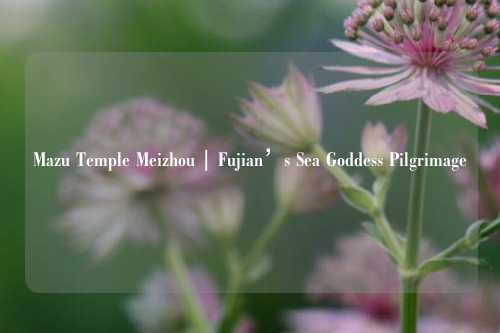Mazu Temple Meizhou | Fujian’s Sea Goddess Pilgrimage
Mazu Temple Meizhou: A Sacred Pilgrimage to the Sea Goddess
Nestled on the picturesque Meizhou Island in Fujian Province, the Mazu Temple is a renowned destination for both spiritual seekers and tourists interested in experiencing the rich history and culture of Chinese maritime traditions. The temple is dedicated to Mazu, the Sea Goddess, who is venerated as the protector of sailors, fishermen, and all those who venture into the sea. As the birthplace of Mazu, Meizhou Island holds deep cultural significance and has become a central point for Mazu worship, drawing thousands of pilgrims each year. The Mazu Temple is not just a religious site but a place that offers a profound connection to the island's maritime heritage and traditions.
A Glimpse into the Legend of Mazu
Mazu, also known as Tianhou, was a historical figure who lived during the Song Dynasty. Born as Lin Moniang on Meizhou Island, she is said to have had supernatural abilities, including the power to calm storms and protect sailors at sea. According to legend, she spent her life helping her community, particularly the fishermen and sailors, by guiding them safely across treacherous waters. Mazu’s legendary acts of protection and her deep connection to the sea earned her the title of Sea Goddess, and she remains one of the most beloved deities in Chinese folklore.

The temple on Meizhou Island is dedicated to Mazu’s life and her role in safeguarding the lives of those who make a living from the sea. Visitors to the Mazu Temple are often touched by the rich history and deep reverence that locals have for the Sea Goddess. The temple not only honors her but also keeps alive the cultural practices associated with her worship, making it a key location for those seeking to understand more about Mazu’s influence and significance.
The Architecture of Mazu Temple
The Mazu Temple on Meizhou Island boasts impressive traditional Chinese architectural design, reflecting the grandeur and spiritual importance of the Sea Goddess. The temple is a beautiful example of classic Fujianese architecture, with ornate eaves, intricate carvings, and large wooden beams that create a majestic and tranquil atmosphere. The temple complex is set against a backdrop of lush greenery, with views of the surrounding coastline and the vast expanse of the sea, providing a serene environment for visitors.
Upon entering the temple, visitors are greeted by the grand hall, which houses a stunning statue of Mazu, depicted in a traditional seated position. This statue is the focal point of the temple, and it is surrounded by offerings, incense, and portraits depicting various scenes from Mazu’s life and miracles. The design of the temple emphasizes symmetry and harmony, with its central courtyard and smaller halls dedicated to other figures in Mazu’s story. The spiritual atmosphere is palpable, and the temple’s construction aligns with the principles of Feng Shui, creating a space that feels both peaceful and powerful.
The Pilgrimage to Mazu Temple
The Mazu Temple in Meizhou Island is not just a place of worship; it is also a pilgrimage site for devotees from across China and beyond. Every year, millions of people visit the temple to pray for blessings, safety at sea, and good fortune. Pilgrims travel from various coastal regions to Meizhou Island, where they perform rituals and offer prayers at the temple. These rituals often include the burning of incense, the offering of fruits and flowers, and the chanting of prayers to invoke Mazu’s protection.
The pilgrimage to Meizhou Island holds deep significance for many, as it is believed that visiting the temple and paying homage to Mazu will ensure safe voyages and protection from natural disasters. The temple’s importance in the lives of sailors and fishermen is reflected in the numerous boats that are docked around the island, with many of them featuring offerings and tributes to Mazu.
The Role of Mazu Temple in Maritime Culture
The Mazu Temple has an enduring role in the maritime culture of Fujian and other coastal areas of China. Mazu’s influence extends far beyond the confines of the temple; her worship is intertwined with the lives of those who depend on the sea for their livelihood. Fishermen and sailors frequently turn to Mazu for guidance and protection before embarking on dangerous journeys. The temple serves as a focal point for these communities, offering both a spiritual sanctuary and a cultural gathering place.
The temple is also a symbol of the enduring connection between the people of Meizhou Island and the sea. The Sea Goddess is seen as a guardian who watches over the local community, ensuring that they remain safe from the hazards of the ocean. This relationship between Mazu and the people is commemorated during annual festivals, which include boat races, prayers, and celebrations that honor her role as protector and benefactor.
Mazu Festival: A Cultural Celebration
One of the most important events held at the Mazu Temple is the Mazu Festival, which takes place every year during the third lunar month. This festival, also known as Mazu’s birthday celebration, attracts thousands of visitors from across the country and around the world. The festival is a vibrant and lively occasion, marked by a series of cultural performances, rituals, and community events.
During the Mazu Festival, the temple is beautifully decorated, and large crowds gather to take part in the celebrations. Processions featuring traditional lion dances, drumming, and other performances take place throughout the island, and devotees engage in prayers and rituals in the temple. The festival is not just a religious event; it is a cultural celebration that highlights the deep connection between the people of Meizhou Island and their maritime heritage. Visitors to the festival will be treated to a visual and auditory feast that immerses them in the lively traditions surrounding Mazu worship.
The Natural Beauty Surrounding the Temple
In addition to its spiritual significance, Meizhou Island offers visitors the chance to explore its stunning natural beauty. The island is known for its breathtaking coastline, lush hills, and peaceful beaches, which create a serene atmosphere perfect for reflection and relaxation. The area surrounding the Mazu Temple is particularly picturesque, with scenic walking paths that allow visitors to enjoy the stunning views of the ocean and the temple’s traditional architecture.
Visitors can take leisurely walks along the island’s rugged coastline, which offers panoramic views of the South China Sea. The island’s lush forests and green hills provide a peaceful escape from the hustle and bustle of everyday life. For those looking to experience both culture and nature, Meizhou Island offers the perfect combination of tranquility and historical significance.
How to Reach Meizhou Island
Reaching Meizhou Island is a relatively straightforward journey for visitors traveling from major cities in China. The island is accessible by ferry from the mainland, with regular boat services connecting Meizhou Island to the nearby cities of Putian and Xiamen. The ferry ride offers scenic views of the coastline, allowing visitors to appreciate the natural beauty of the area before even stepping foot on the island.
Once on Meizhou Island, visitors can easily reach the Mazu Temple by taking a short walk or hiring a local guide. The island is small enough to be explored on foot, and many visitors enjoy wandering through the streets, discovering local markets, and enjoying the laid-back atmosphere of the island.
A Place of Spiritual Reflection and Cultural Discovery
The Mazu Temple on Meizhou Island is much more than a religious site—it is a place where visitors can connect with the rich maritime heritage of Fujian, experience traditional Chinese worship practices, and immerse themselves in the legends surrounding Mazu, the Sea Goddess. Whether you are a devotee seeking blessings, a cultural enthusiast wanting to learn more about Chinese folklore, or a traveler looking for a peaceful retreat, Meizhou Island and its Mazu Temple offer a unique and enriching experience that will leave a lasting impression.
The combination of spiritual reverence, cultural significance, and natural beauty makes the Mazu Temple a must-visit destination for those traveling to Fujian Province. As you step into the temple and hear the soft prayers of devotees, it’s easy to feel the deep sense of history and devotion that surrounds this sacred site. A visit to Mazu Temple is an opportunity to not only learn about the goddess’s protection over the seas but also to experience the timeless traditions that continue to shape the lives of those who live by the water.
















